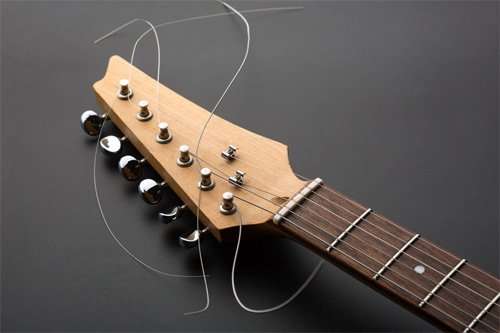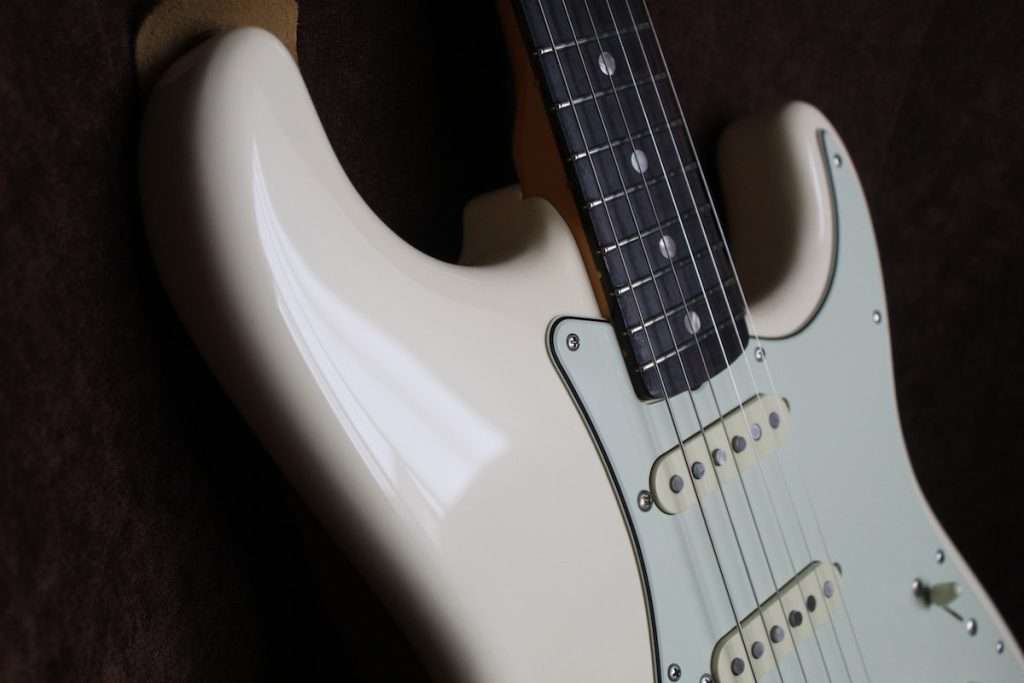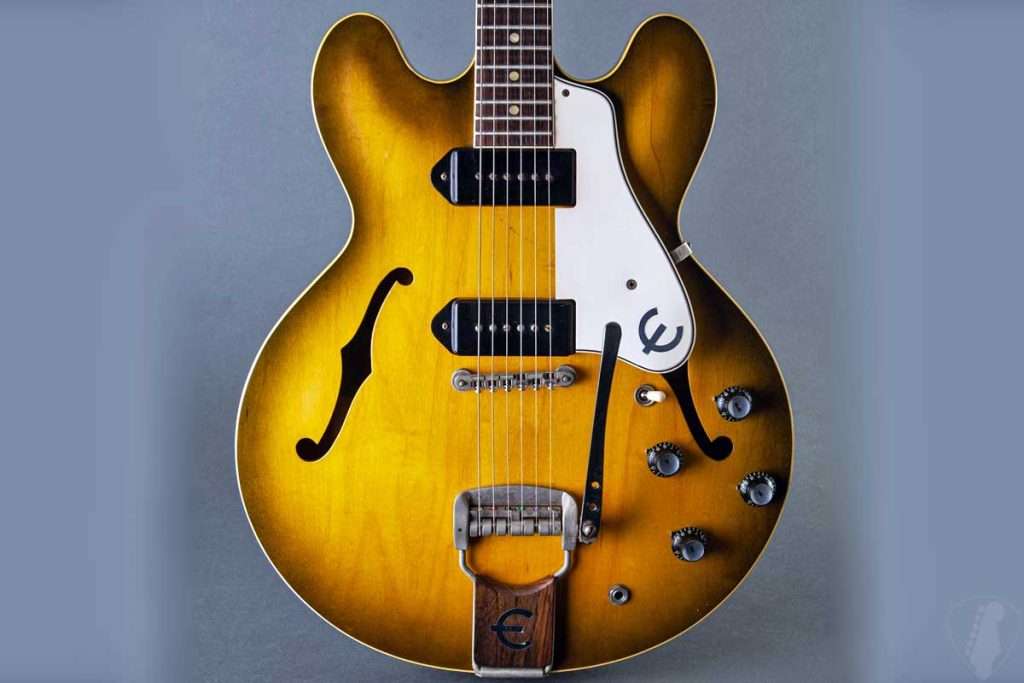Embarking on the journey of learning guitar at 50 is a truly enriching experience. This musical adventure transcends age barriers, offering immense joy and numerous life benefits whether you’re a teenager, in your twenties, or approaching your fifties.
Because of its versatility, the guitar has become a popular instrument for expressing a wide range of emotions and musical styles. Even at the age of 50, embracing this new endeavor opens up a world of possibilities for self-expression, personal growth, and pure enjoyment for yourself and others!

The Joy in Learning Guitar at Any Age
Learning to play the guitar instills passion in us, allowing us to express ourselves through strumming chords or picking melodies.
This creative outlet offers solace during difficult times and celebrates life’s victories. Learning to play the guitar at any age provides cognitive benefits that benefit our mental faculties.
According to research, listening to music improves memory retention and concentration while also strengthening neural connections and problem-solving abilities.
The emotional benefits of learning to play the guitar are equally profound. By providing therapeutic relaxation techniques, playing an instrument provides an escape from daily stresses.
The gentle strumming or delicate fingerpicking transports us into a state of calm, providing a welcome respite from the chaos of life.
The Unique Challenges & Advantages of Starting at 50
While beginning the guitar journey at the age of 50 has its challenges, it also has its advantages. You have a wealth of wisdom and discipline as a person with five decades of life experience that you can use to accelerate your progress.
Patience and determination developed over time allow for a focused and dedicated approach to learning the instrument, which is an invaluable asset in mastering its complexities.
Nonetheless, it is critical to recognize that certain physical limitations may arise when starting at the age of 50. Flexibility and dexterity may not be as effortless as they once were, but age is no barrier to achieving guitar proficiency.
Progress will undoubtedly be made with consistent practice and proper technique. Another significant benefit of learning to play the guitar later in life is the increased likelihood of having more time available for practice.
Often, empty nesters or retirees have more time to devote to pursuing their musical dreams, a luxury that younger people may not have due to responsibilities or time-consuming careers. In essence, starting your guitar journey at 50 presents a unique set of challenges and benefits.
It is critical to seize growth opportunities while remaining patient with oneself throughout the process. Remember that music makes no age distinctions; it welcomes all who seek its solace and beauty.
Cognitive Benefits
Improved Memory & Concentration
Learning to play the guitar at the age of 50 improves memory and concentration significantly. The brain stimulates its ability to retain information by memorizing chords, scales, and songs, strengthening neural connections and improving memory function.
This mental exercise helps not only with guitar skills, but also with other areas that require recall abilities.
Furthermore, practicing melodies or complex musical arrangements improves concentration levels because focusing on each note and rhythm trains the brain to maintain attention for longer periods of time, which can carry over into daily activities that require sustained focus.
Enhanced Problem-Solving Skills
Learning to play the guitar promotes cognitive development by requiring critical thinking and creativity.
Players can overcome playing obstacles by analyzing music sheets and instructional videos to identify finger placements and strumming patterns.
Engaging in problem-solving exercises during guitar practice sessions improves one’s ability to troubleshoot problems in all aspects of life, not just music.
Increased Creativity & Mental Flexibility
Playing the guitar fosters creativity by allowing for musical expression and the release of creativity.
It promotes creativity and the exploration of various musical ideas. Experimenting with chord progressions and scales improves mental flexibility, allowing for quick adaptation to new musical contexts and improv opportunities.
This mental flexibility extends beyond music, cultivating problem-solving versatility as well as openness to new ideas and perspectives.
Emotional Benefits
Stress Relief & Relaxation
Learning to play the guitar at the age of 50 can be a stress-reduction tool, providing a break from the stresses of daily life.
Music reduces cortisol levels and increases endorphin production, promoting emotional well-being.
Relaxation is induced by playing gentle melodies or mindful strumming, which creates a harmonious balance and emotional sanctuary.
Boosted Self-Confidence & Sense of Accomplishment
Learning new skills at any age increases confidence and gives a sense of accomplishment. Learning to play the guitar is one such example.
Conquering difficult chords and playing entire songs becomes increasingly rewarding as you progress.
Each achievement demonstrates your commitment, boosting your self-esteem and confidence in your abilities. Participating in social interactions and jam sessions boosts confidence as well.
Opportunities for Self-Expression & Emotional Release
The guitar is a powerful tool for self-expression and emotional release, allowing people to express difficult emotions through music.
It serves as an extension of emotions, allowing one to connect with oneself on a deeper level while also inviting others to experience their unique expression through sound.
The guitar, whether playing joyful strumming or reflecting on sorrow, serves as a personal language that transcends words.
Physical Benefits
Fine Motor Skill Development in Hands, Fingers, and Wrists
Playing the guitar demands intricate movements of the hands, fingers, and wrists. As a result, practicing regularly enhances fine motor skills.
The deliberate coordination required to fret chords accurately or pluck strings cultivates precision and dexterity in these specific areas. Over time, your fingers become more nimble and agile, allowing you to navigate the fretboard with greater ease and fluidity.
Improved Hand-Eye Coordination & Dexterity
Playing the guitar helps to improve hand-eye coordination by synchronizing visual cues with physical movements.
Regular practice strengthens the muscles in the hands and fingers, improving dexterity in everyday tasks such as typing or sports.
Guitar practice not only improves memory, concentration, and problem-solving abilities, but it also provides emotional upliftment, stress relief, self-confidence boost, self-expression, and physical benefits such as improved fine motor skills and hand-eye coordination.
Individuals over the age of 50 who embrace guitar can reap cognitive, emotional, and physical benefits.
Getting Started: Choosing the Right Guitar
Overview of different types: acoustic, electric, classical, etc.
When starting your guitar journey, it’s crucial to understand the different types of guitars available. Acoustic guitars produce sound through a hollow body and are ideal for folk, country, or singer-songwriter styles.
Electric guitars require amplification and are popular in rock, blues, and jazz genres due to their versatility and ability to produce various tones. Classical guitars have nylon strings and are perfect for classical music enthusiasts or those seeking a softer sound.
Factors to consider when selecting a guitar:
Choosing the right guitar involves considering several factors that will impact your playing experience.
Budget constraints: Determine how much you’re willing to spend on a guitar. Remember that investing in a quality instrument can enhance your enjoyment and progress.
Personal preferences (sound, style): Think about the type of music you enjoy and identify the sound you want to achieve. Different guitars have distinct tonal qualities that cater to various musical styles.
Physical comfort (size, weight): Ensure that the guitar feels comfortable in your hands and suits your body size. Consider trying out different sizes and shapes at a local music store before making a decision.
Essential Equipment for Beginners
Guitar Accessories
To get started on your guitar journey, certain accessories are essential:
Picks (different thicknesses): Experiment with picks of varying thicknesses to find one that suits your playing style. Thinner picks offer more flexibility for strumming chords while thicker picks provide better control for intricate picking patterns.
Tuner (electronic or smartphone app): A reliable tuner is crucial for keeping your guitar in tune. Electronic tuners or smartphone apps can assist in achieving accurate pitch and maintaining proper intonation.
Capo (for changing keys easily): A capo is a valuable tool that allows you to easily change the key of a song without having to learn different chord shapes. It creates a “bar” across the neck, effectively raising the pitch of all strings.
Related: How to use a guitar capo
Learning Materials
Investing in appropriate learning materials will greatly support your progress:
Beginner guitar books or online courses: Numerous beginner-friendly resources, such as books or online courses, provide structured lessons and guidance. Look for reputable sources that offer clear explanations, exercises, and songs suitable for beginners.
Chord charts or diagrams: Chord charts or diagrams visually represent finger placements on the guitar fretboard. These references help you learn and memorize guitar chords more effectively, making it easier to play songs.
Developing a Practice Routine
Importance of consistency in practice
Consistency is key when learning guitar. Establishing a regular practice routine ensures steady progress and prevents skills from stagnating.
Aim for shorter daily practice sessions instead of infrequent lengthy ones. Consistency helps develop muscle memory, allowing your fingers to move effortlessly across the fretboard over time.
Setting realistic goals for progress
Setting realistic goals is essential to maintain motivation throughout your guitar journey.
Break down larger objectives into smaller achievable milestones. Whether it’s mastering basic chords, playing a specific song, or improving fingerpicking technique, celebrate each accomplishment along the way.
Balancing structured learning with creative exploration
While structured learning provides necessary foundations, don’t forget to balance it with creative exploration or simply playing your favorite songs.
Experimentation encourages personal expression and fosters musicality by allowing you to apply techniques in unique ways. Improvisation exercises, songwriting, or jamming with others can enhance your overall guitar experience.
Conclusion
Embarking on a journey to learn the guitar at 50 may seem daunting, but it is never too late to pursue one’s passion for music.
By choosing the right guitar based on personal preferences, investing in essential equipment, developing a consistent practice routine, and exploring appropriate learning resources, older beginners can thrive in their musical endeavors. Remember that progress comes with dedication and patience.
Embrace the joy of learning and let your newfound musical ability bring fulfillment into your life. Your age should never limit your pursuit of artistic expression!
Related: Learning Guitar At 40




